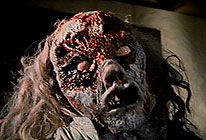|
|
|
|
The
Evil Dead
|
 |
|
This "ultimate experience in grueling [sic] horror", as it immodestly bills itself in the end credits, changed the history of its genre. Sam Raimi took the gore from Italian horror movies and mixed it with a proudly juvenile sense of humour – for instance, he makes its teenage heroes so vapidly wholesome that we cannot wait for them, once they are holed up in a remote country shack, to die or be transformed into undead monsters. This self-consciousness about the conventions and clichés of the form would come to dominate screen horror in its Scream-led years. It changed film criticism, too: such an obviously meaningless, purely playful text refused the then-fashionable tools of ideological and psychoanalytic reading. The Evil Dead is the ultimate movie-nerd success story, flagrantly amateurish and hand-made in many of its effects (such as the animated decompositions of bodies), but powered by a full-on score and soundscape, as well as the ubiquitous use of rapid, low-to-the-ground shots from the viewpoint of the spirits. Raimi had absorbed lessons from the '70s generation of William Friedkin, Wes Craven, George Romero and Brian De Palma, adding a homegrown surrealism (somewhere between Jean Cocteau and Tex Avery) that makes this film occasionally resemble the zany, avant-garde games of Raúl Ruiz. In Bruce Campbell, nowadays a trash-movie icon, Raimi found a sympathetically cartoonish star. Today, it is hard to see anything but the comedy in The Evil Dead, especially in the light of its even more exaggerated sequels, Evil Dead II (1987) and Army of Darkness (1993). But it must be remembered that, in 1982, the film had the same terrifying effect on audiences as The Blair Witch Project seventeen years later. In both films, a minimalist rawness combined with intense, inventive filmmaking took spectators out of their comfort zone for a precious, little while. MORE Raimi: For Love of the Game, The Gift, A Simple Plan, Spider-Man, Spider-Man 2, The Quick and the Dead © Adrian Martin June 2003 |
![]()